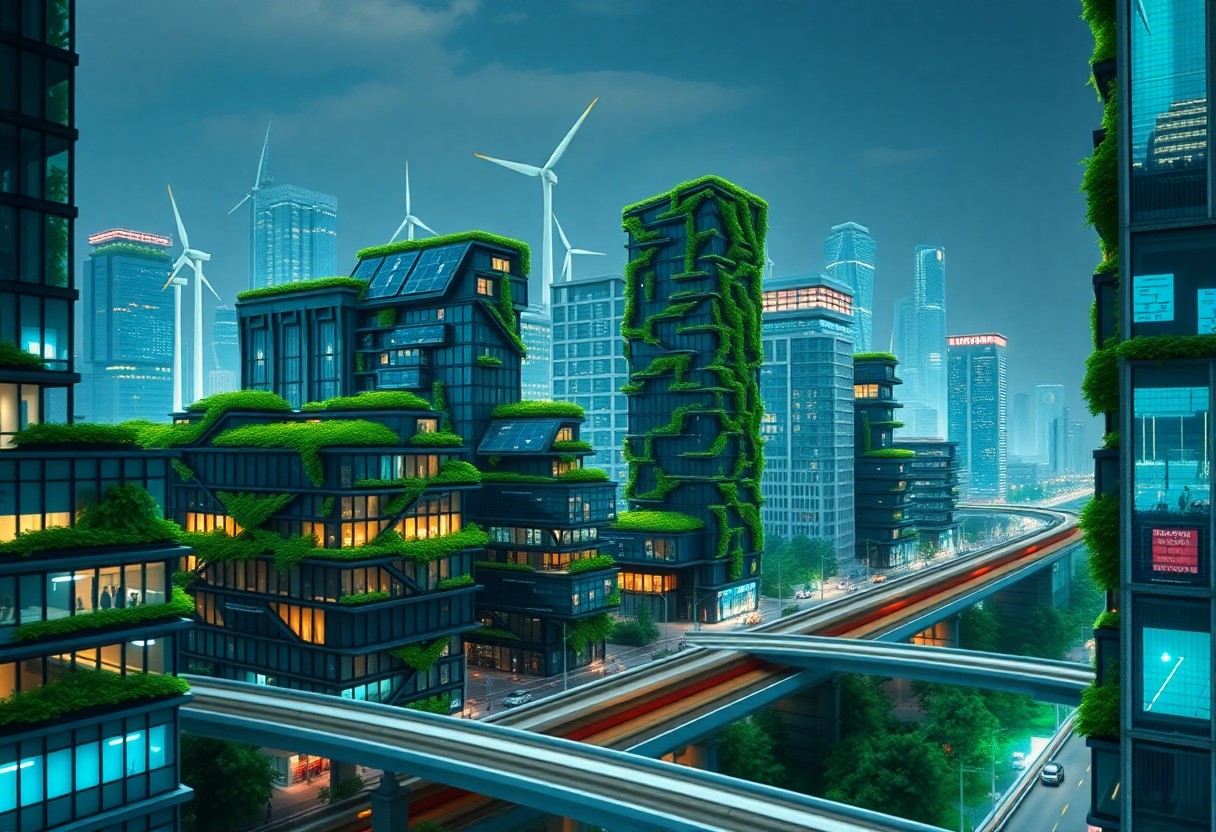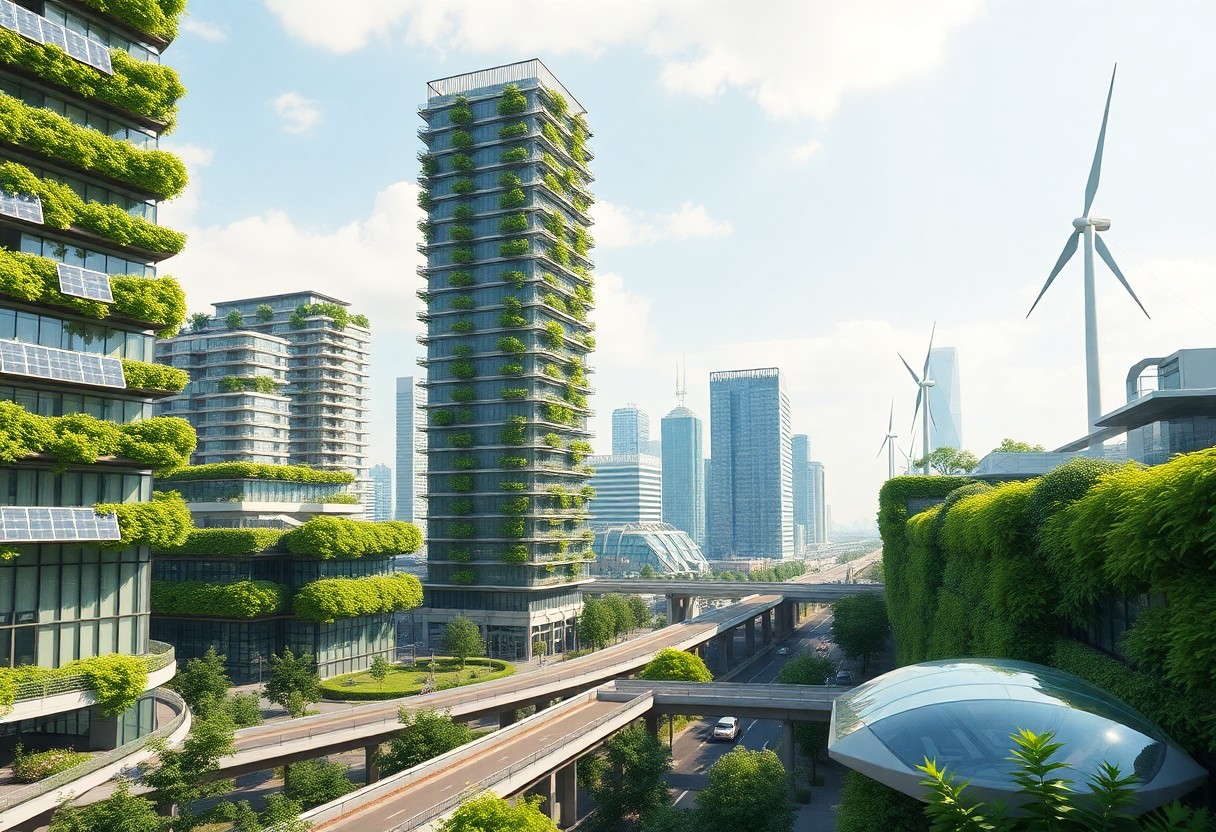Eco-Technology represents a vital intersection of innovation and sustainability that directly impacts your daily life and the health of our planet. As you explore this evolving landscape, you’ll discover how renewable energy sources, sustainable materials, and smart technologies are shaping a greener future. Understanding eco-technology’s role can empower you to make informed choices that benefit both your lifestyle and the environment. This blog post will explore how these advancements are transforming industries and what they mean for you as an individual in today’s world.

Table of Contents
Key Takeaways:
- Eco-technology emphasizes sustainable practices that aim to reduce environmental impact while fostering economic development.
- Innovation in eco-technology often integrates renewable energy sources, such as solar and wind, to promote cleaner production methods.
- Many organizations are adopting eco-technology not only to comply with regulations but also to meet consumer demand for greener products.
- Collaboration between governments, businesses, and researchers is vital to drive advancements in eco-technology and create scalable solutions.
- Investments in eco-technology are expected to increase, given the rising awareness of climate change and the need for sustainable practices across various sectors.
Defining Eco-Technology
Before diving deep into eco-technology, it’s necessary to understand the core concept that is shaping numerous innovations in today’s world. Eco-technology refers to the design and implementation of technology that is mindful of the environment, aiming to reduce its negative impacts while enhancing ecological sustainability. It forms a bridge between technological advancement and the pressing need for environmental conservation, ensuring that your innovations contribute positively to the planet.
Understanding Eco-Technology
Along this journey, you will discover that eco-technology encompasses various fields, including renewable energy, waste management, and sustainable agriculture. It emphasizes the development of products and processes that utilize resources more efficiently and produce less waste. By integrating eco-friendly materials and methods into your projects, you not only elevate your work but also help mitigate the effects of pollution, climate change, and resource depletion.
Key Principles of Eco-Technology
For you to harness the benefits of eco-technology, it’s important to understand its key principles. These principles often include reducing resource consumption, utilizing renewable resources, minimizing waste, and promoting social equity. Engaging with these principles allows you to design solutions that not only serve immediate needs but also ensure the well-being of future generations.
And as you examine deeper into these principles, you’ll find that eco-technology encourages innovation that prioritizes ecological health. This means that your approaches should consider the lifecycle of materials, advocate for energy efficiency, and support biodiversity. These core tenets empower you to create technologies that harmonize with nature rather than disrupt it, leading to a more sustainable and effective outcome.
Historical Context and Evolution
Around the mid-20th century, public awareness of environmental issues began to rise dramatically, prompting innovators and scientists to explore eco-friendly alternatives to traditional technologies. This era marked the beginnings of eco-technology as a response to growing concerns such as pollution, deforestation, and climate change. As your understanding of this evolution unfolds, you’ll see how innovations from waste recycling to solar panels emerged to address these challenges directly.
At this pivotal moment in history, eco-technology began to gain traction as a framework for innovation. Understanding where it all began allows you to appreciate the strides made since then and recognize the legacy of thinkers and pioneers who paved the way for a newer, greener approach to technology. Today’s advances in eco-technology are a testament to how far we’ve come while challenging you to continue this vital journey toward sustainability.
The Importance of Eco-Technology in Today’s Innovation Landscape
Clearly, the significance of eco-technology goes beyond mere environmental concerns; it creates a compelling blueprint for innovation that addresses the increasing challenges posed by climate change and resource scarcity. As you navigate through today’s innovation landscape, understanding eco-technology’s role is important for both businesses and consumers seeking sustainable options that align with modern ecological values. By embracing eco-friendly solutions, you can actively participate in creating a more sustainable future while potentially reaping the benefits of new market opportunities that arise in the era of environmentally conscious development.
Addressing Climate Change
With the global urgency to combat climate change, eco-technology plays a pivotal role in innovating solutions that reduce greenhouse gas emissions and enhance our ability to adapt to shifting environmental conditions. By integrating renewable energy sources, developing energy-efficient technologies, and promoting sustainable practices, you can contribute to a more resilient planet. These innovations are not simply reactive; they serve as proactive measures against climate threats, allowing you to take charge of your environmental impact.
Moreover, as eco-technologies continue to evolve, they become more accessible and affordable, encouraging widespread adoption. You can see how advancements like solar panels, wind turbines, and smart grids are becoming common features in homes and businesses, enabling you to reduce your carbon footprint while also enjoying the economic benefits associated with energy savings. By investing in eco-technology, you position yourself as an advocate for a sustainable future that prioritizes the health of our planet.
Resource Efficiency and Sustainability
Among the most critical aspects of eco-technology is its capacity to drive resource efficiency and sustainability in various sectors. As you engage with these technologies, you’ll find that they prioritize the optimal use of resources, minimizing waste through innovative processes and closed-loop systems. This shift not only conserves valuable natural resources but also contributes to economic savings for businesses and consumers alike.
Hence, embracing eco-technology encourages a mindset focused on longevity and regenerative practices. You can discover ways to innovate not just for profits but also for the greater good, ensuring that your actions today do not compromise the needs of future generations. This growing emphasis on sustainability leads to a transformative approach where environmental considerations shape strategic decision-making across industries, amplifying the impact of eco-technology.
Economic Implications and Growth Opportunities
Among the economic implications of eco-technology, you will notice a significant shift towards green jobs and industries geared toward sustainability. This expansion in eco-friendly sectors often leads to new growth opportunities, as companies increasingly seek solutions that meet environmental standards while also achieving profitability. By aligning your business strategies with eco-technological advancements, you can tap into emerging markets that prioritize sustainable practices and social responsibility.
Furthermore, as consumers become more environmentally conscious, they are actively seeking products and services that reflect their values. For instance, businesses that integrate eco-technology into their operations can attract a loyal customer base keen on supporting sustainable practices. This trend not only fosters brand loyalty but also opens pathways for innovative collaborations across various sectors, amplifying your reach and impact in the marketplace.
For instance, industries such as renewable energy, sustainable agriculture, and recycling are poised for exponential growth, and being at the forefront of these changes can place you in a prime position to capitalize on new business ventures. As you explore these opportunities, consider how eco-technology can not only fulfill ethical obligations but also drive profitability and innovation in your endeavors.
Key Areas of Eco-Technology Development
After considering the various dimensions of eco-technology, it becomes clear that its development is vital for addressing the environmental challenges faced today. Eco-technology, as defined in the Ecotechnology landscape, encompasses innovations that promote sustainability and efficient use of resources. Below, you will discover several key areas where eco-technology is making significant strides, each contributing uniquely to a more sustainable future.
Renewable Energy Sources
Between solar, wind, hydro, and geothermal energy, you will find an incredible range of renewable energy sources reshaping the energy sector. Transitioning to renewable energy not only reduces greenhouse gas emissions but also enhances energy security by diversifying your energy portfolio. As you explore these sources, you’ll see how they impact both the environment and your personal energy consumption.
The shift towards renewable energy is amplified by technological advancements that make these resources more competitive. Innovations such as energy storage solutions and smart grids increase the efficiency and reliability of renewable energy systems, making them more accessible for you. By embracing these developments, you can contribute to a more sustainable energy future.
Sustainable Agriculture Practices
Against the backdrop of traditional agriculture, sustainable practices are emerging as necessary alternatives that prioritize ecological balance and community health. You should recognize how these practices, such as organic farming, agroforestry, and permaculture, aim to reduce the environmental impacts associated with conventional farming methods. Implementing sustainable agricultural techniques can lead to not only healthier food systems but also promote biodiversity.
Moreover, sustainable agriculture practices are increasingly recognized for their potential to enhance soil health and improve water retention, providing long-term benefits for both farmers and consumers. As you engage with these methods, you may find opportunities to support local economies and make more informed food choices.
And yes, investing your time and resources into sustainable agriculture practices can yield positive returns. You can contribute to a system that not only supports food security but also enhances the ecological balance by reducing dependency on chemical fertilizers and pesticides.
Green Building Technologies
For many individuals and organizations today, green building technologies are becoming critical in the construction industry. These technologies encompass a variety of practices and innovations aimed at minimizing environmental impact, improving energy efficiency, and enhancing occupant comfort. Incorporating energy-efficient appliances, high-performance insulation, and sustainable building materials can significantly reduce your carbon footprint.
Furthermore, the integration of renewable energy sources, like solar panels, into building designs allows you to create structures that generate their own energy. By adopting green building technologies, you are not only improving user quality of life but also aligning with broader sustainability goals and regulations.
It is necessary to understand that embracing green building practices can lead to long-term economic benefits through reduced utility costs and increased property values. You can play an active role in fostering a sustainable built environment that aligns with both your personal values and commitments to environmental responsibility.
Water Conservation and Management
Below the surface of many urban and rural water systems lies a critical need for advanced water conservation and management techniques. You may not realize how prevalent water scarcity is becoming, which heightens the importance of adopting innovative solutions. Technologies such as rainwater harvesting, greywater recycling, and efficient irrigation systems help you use this precious resource wisely.
By implementing effective water management strategies, you can reduce waste and ensure that you and future generations have access to clean water. Employing smart water meters and embracing smart irrigation technology can aid in making informed decisions about your water usage and conservation efforts.
Sources suggest that incorporating water conservation measures can lead to not only environmental benefits but also economic savings on water bills. With enhanced awareness and commitment to managing your water consumption, you can join the movement towards a more sustainable and water-conscious future.
Case Studies of Successful Eco-Technologies
Not only are eco-technologies improving the quality of life, but they also contribute to a sustainable future. Here are some notable case studies showcasing successful eco-technologies:
- Solar Energy Innovations: In 2022, the global capacity for solar energy reached 1,000 GW, demonstrating a growth of over 24% from the previous year.
- Waste-to-Energy Projects: Facilities in Europe convert approximately 100 million tons of waste annually into energy, providing power equivalent to that used by 2 million households.
- Biodegradable Materials: The market for biodegradable plastics in 2023 surpassed $5 billion, with a projected annual growth rate of 20% through 2028.
- Carbon Capture and Storage Technologies: As of 2023, over 30 million tons of CO2 have been captured globally, contributing significantly to climate change mitigation efforts.
Solar Energy Innovations
Before you probe the numerous benefits of solar energy, it is imperative to acknowledge the profound advancements in this field. For instance, innovative solar panel designs have achieved cell efficiencies greater than 22%, enabling more energy capture from the same surface area. Companies like SunPower and First Solar have been at the forefront, developing cutting-edge solar technologies that can withstand extreme weather conditions while maximizing energy production.
Moreover, the incorporation of solar energy into urban planning through solar rooftops and integrated photovoltaic systems is a significant trend. Cities employing solar infrastructure have reported reductions in electricity costs by up to 40%, providing both financial and environmental benefits to residents.
Waste-to-Energy Projects
Along the lines of sustainable innovation, waste-to-energy (WtE) projects have gained notable traction globally. These facilities do more than just reduce landfill waste; they generate power as well. For instance, a leading WtE plant in Sweden processes over 1.4 million tons of waste each year and produces enough energy to power approximately 250,000 households. This process not only diverts waste from landfills but also significantly cuts greenhouse gas emissions.
Additionally, countries like Germany have harnessed WtE technologies, achieving recycling rates of over 60%, making their energy production from waste a notable aspect of their circular economy model.
Plus, these waste-to-energy plants operate safely and efficiently, ensuring that emissions are controlled to meet strict environmental regulations. They represent a dual solution to two pressing issues: waste management and energy production, highlighting the effectiveness of eco-technologies in society.
Biodegradable Materials
Among the innovative materials that stand out today, biodegradable options have gained increased attention for their environmentally friendly attributes. Companies are actively developing alternatives to traditional plastic, which often end up in lands far from waste management facilities. For instance, recent advancements in the production of PLA (polylactic acid) plastics present a viable alternative made from natural resources like corn or sugarcane, which decompose under proper conditions within 6 to 12 months.
This shift towards biodegradable materials is not just beneficial for the environment; it also aligns with consumer demand for sustainable products. As awareness of the plastic pollution crisis grows, the market for biodegradable materials could reach $11 billion by 2027.
EcoTechnologies in this sector are significant, as they aim to reduce the environmental footprint of manufacturing and consumption. The emergence of biodegradable packaging solutions serves as a key element in combating plastic pollution while promoting green business practices.
Carbon Capture and Storage Technologies
One noteworthy development in eco-technology is in carbon capture and storage (CCS). This innovative process allows you to capture up to 90% of the carbon dioxide emissions produced from the use of fossil fuels in electricity generation and industrial processes. Projects like the Sadaf Project in the Middle East and the Quest Project in Canada have showcased successful implementations of CCS, capturing millions of tons of CO2 and storing them underground.
In fact, the global capacity for CCS has doubled over the past few years, with various governments investing heavily in research and development. This technology is crucial in achieving climate targets and preventing further environmental degradation.
At the forefront of climate action, carbon capture and storage technologies play a vital role in transitioning toward a low-carbon economy. As we face the persistent threat of climate change, these advancements could significantly mitigate harmful emissions, opening up new avenues for achieving your environmental goals.

Challenges in Implementing Eco-Technology
Now, as you probe deeper into the world of eco-technology, it becomes evident that implementing these innovations involves a multitude of challenges. Understanding these barriers can help better prepare you to navigate the complexities of adopting eco-friendly solutions in your endeavors.
Financial Barriers and Investment
About the financial aspect, venturing into eco-technology often requires a considerable upfront investment, which can deter many businesses and individuals. The initial costs associated with purchasing or developing sustainable technologies can seem overwhelming, particularly when compared to conventional options that may offer lower short-term expenses. For you, this could mean carefully weighing the benefits of long-term cost savings and environmental impact against the significant initial financial commitment.
Moreover, obtaining sufficient funding or investment can be a major hurdle. Many investors still prioritize traditional technologies over eco-friendly alternatives, viewing them as high-risk despite their potential for strong returns. To advance eco-technology in your community or enterprise, it may be necessary to identify funding sources dedicated to sustainable projects, as well as develop creative financial strategies that underscore the long-term benefits of these investments.
Regulatory and Policy Issues
Challenges in the regulatory framework can also impede the progress of eco-technology adoption. With varied regulations across regions and industries, finding a pathway that aligns with eco-friendly innovations can become complex. Organizations or individuals looking to implement these technologies might face lengthy approval processes and bureaucratic hurdles, often resulting in delays and increased costs.
The evolving nature of environmental policies can further complicate matters. Regulations may not keep pace with rapid technological advancements, leading to uncertainties in compliance that can stifle innovation. For you, staying informed about current and upcoming policies is vital, as adapting to these changes can significantly impact the feasibility and effectiveness of eco-technology projects.
Public Awareness and Acceptance
Any successful implementation of eco-technology is contingent upon public awareness and acceptance. Without a strong understanding of the benefits and functionalities of these technologies, potential users may remain skeptical or reluctant to make the switch. You may encounter misconceptions about the reliability and efficiency of eco-technologies, which can inhibit widespread adoption and usage.
It’s necessary to prioritize educational initiatives that raise awareness about the positive impacts of eco-technology on climate change, resource conservation, and overall sustainability. By actively engaging in community discussions and providing transparent information, you can help cultivate a more informed public that is open to embracing these innovations.
Technological Limitations
EcoTechnology can also be hampered by technological limitations. As you explore eco-friendly solutions, you may find that not all emerging technologies are fully developed or commercially viable. Some eco-technologies may still be in their infancy, resulting in less reliable performance and efficiency compared to their traditional counterparts. This can present a significant barrier for you when making decisions that require immediate results.
Furthermore, the integration of eco-technology into existing infrastructure can pose technical challenges. Adapting current systems to accommodate these sustainable innovations may demand specialized knowledge and skills that are not readily available in your workforce. Addressing these technological barriers will require a combination of innovation, training, and collaboration between various stakeholders within your industry.
Technological limitations can further extend to issues of scalability and compatibility with current systems. If you are employing eco-technologies, understanding the constraints and readiness for integration is key to your success in transitioning to a sustainable model.

The Future of Eco-Technology
Your understanding of eco-technology is vital, especially as it continues to evolve in today’s innovation landscape. As you investigate deeper into this dynamic field, consider exploring An Introduction to Eco-innovation for Business. This resource will equip you with vital knowledge of how eco-technology can enhance business practices and influence sustainable development strategies.
Emerging Trends and Innovations
Below, you will discover how emerging trends and innovations are shaping the eco-technology landscape. Advancements in renewable energy sources, such as solar and wind power, continue to gain momentum, significantly reducing our reliance on fossil fuels. Additionally, breakthroughs in carbon capture and storage technologies promise to further mitigate the impacts of climate change, making it possible to thrive in a greener economy.
As technology evolves, you can expect to see a growing emphasis on circular economy principles, which aim to reduce waste and promote the continual use of resources. This innovative approach not only benefits the environment but also drives economic growth by optimizing resource efficiency. Businesses are increasingly adopting micro-manufacturing techniques and smart technologies to enhance sustainability, encouraging you to be part of this transformative movement.
Collaborative Efforts in Eco-Tech Development
Between corporations, startups, and governmental agencies, collaboration is becoming a cornerstone of eco-technology development. By pooling resources and knowledge, these entities can accelerate innovation and drive significant progress toward sustainability. This approach enables you to leverage synergistic partnerships that effectively tackle environmental challenges while maximizing economic opportunities.
Collaborative initiatives, such as public-private partnerships, are emerging as powerful drivers of eco-tech innovations. These collaborations allow innovators to combine expertise and share the risk associated with developing new technologies. In turn, this fosters a more efficient ecosystem that can deliver impactful solutions to pressing environmental issues.
Role of Public and Private Sectors
Collaborative efforts between public and private sectors play a vital role in shaping the future of eco-technology. Governments increasingly provide funding and incentives for eco-innovation, encouraging businesses to adopt sustainable practices. You can take advantage of these opportunities to implement more environmentally conscious strategies within your own practices.
Emerging trends indicate that these public-private partnerships will only strengthen, promoting advancements in renewable materials, waste reduction technologies, and other eco-solutions. The continued support from both sectors fosters an environment where eco-technology can flourish and create lasting positive impacts on your community and the planet.
Predictions for Global Impact
Global advancements in eco-technology are poised to leave a lasting imprint on the environment, as innovations continue to address climate change and sustainability. Over the next decade, you might witness a significant increase in the adoption of green technologies across various industries, from transportation to agriculture. This shift will likely enhance energy efficiency and promote sustainable practices on a global scale.
The growing awareness of climate-related challenges reinforces the momentum for eco-tech innovations. As consumers and businesses alike push for more sustainable choices, you can expect a transformation that prioritizes reducing carbon footprints and promoting regenerative practices, thereby safeguarding our planet for future generations.
The trajectory of eco-technology indicates that its influence will be profound, offering the potential for revolutionary changes in how we interact with the environment. By embracing innovative solutions and sustainable practices, you can contribute to a healthier planet, while also benefiting from the economic opportunities that arise from prioritizing eco-friendly advancements.
Summing up
Upon reflecting on the significance of eco-technology in today’s innovation landscape, you can see how it serves as a bridge between environmental sustainability and technological advancement. As your understanding deepens, you realize that eco-technology encompasses a wide array of practices, products, and solutions designed to minimize ecological harm while maximizing efficiency and performance. This paradigm shift encourages you to think critically about your consumer choices, your impact on the planet, and how you can contribute to a more sustainable future through innovative solutions.
Moreover, the integration of eco-technologies across various sectors, from energy to agriculture, illustrates the versatility and necessity of these advancements in solving modern challenges. As you explore the myriad applications of eco-technology, you are invited to not only embrace these innovations but also advocate for their broader adoption in your community. By doing so, you actively participate in a transformative movement that emphasizes long-term ecological balance, demonstrating that your role in the innovation landscape is not just as a consumer but also as a catalyst for change.
FAQ
Q: What is eco-technology?
A: Eco-technology refers to technology that is developed and utilized to mitigate environmental impact, promote sustainability, and enhance the efficient use of resources. It encompasses a wide range of innovations including renewable energy systems, waste reduction technologies, and sustainable agriculture practices. By integrating environmentally friendly principles into design and engineering processes, eco-technology aims to create solutions that are beneficial for both people and the planet.
Q: How does eco-technology influence innovation in various industries?
A: Eco-technology drives innovation across industries by encouraging companies to adopt sustainable practices and products. In sectors such as construction, eco-friendly building materials and energy-efficient designs are becoming standard. In transportation, electric vehicles and alternative fuels are gaining traction. As companies strive to meet consumer demand for sustainability, they often invest in research and development of eco-technological solutions, leading to further innovation.
Q: What are some examples of eco-technology in practice?
A: There are numerous examples of eco-technology, such as solar panels that harness renewable energy, wind turbines that generate electricity, and water purification systems that reduce water waste. Additionally, bioplastics made from renewable resources provide alternatives to traditional plastics, while smart grids optimize energy distribution for efficiency. These innovations exemplify how eco-technology can reshape industries towards sustainable practices.
Q: What role does government policy play in promoting eco-technology?
A: Government policy is instrumental in promoting eco-technology through incentives, regulations, and funding for research and development. Tax credits for renewable energy installations, grants for sustainable projects, and stricter emissions standards compel businesses to innovate sustainably. These policies create an environment where eco-technologies can thrive and provide a competitive edge for companies committed to sustainability.
Q: How can consumers support eco-technology?
A: Consumers can support eco-technology by making informed choices about the products they buy and the companies they support. Purchasing energy-efficient appliances, choosing sustainably sourced materials, and utilizing public transportation are practical ways to contribute. Additionally, advocating for policies that promote sustainability and eco-innovation can help drive change at a larger scale.
Q: What challenges does eco-technology face in the market?
A: Eco-technology faces several challenges, including high initial costs, lack of consumer awareness, and resistance from traditional industries. Many eco-friendly products may require significant upfront investment, deterring consumers and businesses. Additionally, the need for widespread education about the benefits and functionality of these technologies is crucial for broader adoption. Market entry barriers for new eco-technological innovations can also limit their development.
Q: What is the future outlook for eco-technology in innovation?
A: The future of eco-technology appears promising as global awareness of climate change and environmental issues continues to grow. Innovations in energy storage, carbon capture, and sustainable product design are likely to expand. As industries increasingly focus on sustainability, we can expect further advancements in eco-technology, leading to a more sustainable and resource-efficient economy in the years to come.

Our contributing author is a passionate advocate for eco-friendly living and sustainability. With a background in eco-life, they are dedicated to inspiring and empowering individuals to adopt environmentally conscious lifestyles. Through insightful articles, they share practical tips, innovative solutions, and thought-provoking perspectives to promote a greener, more sustainable world. Join them on the journey towards eco-smart living and discover how small choices can make a big impact. 🌱








